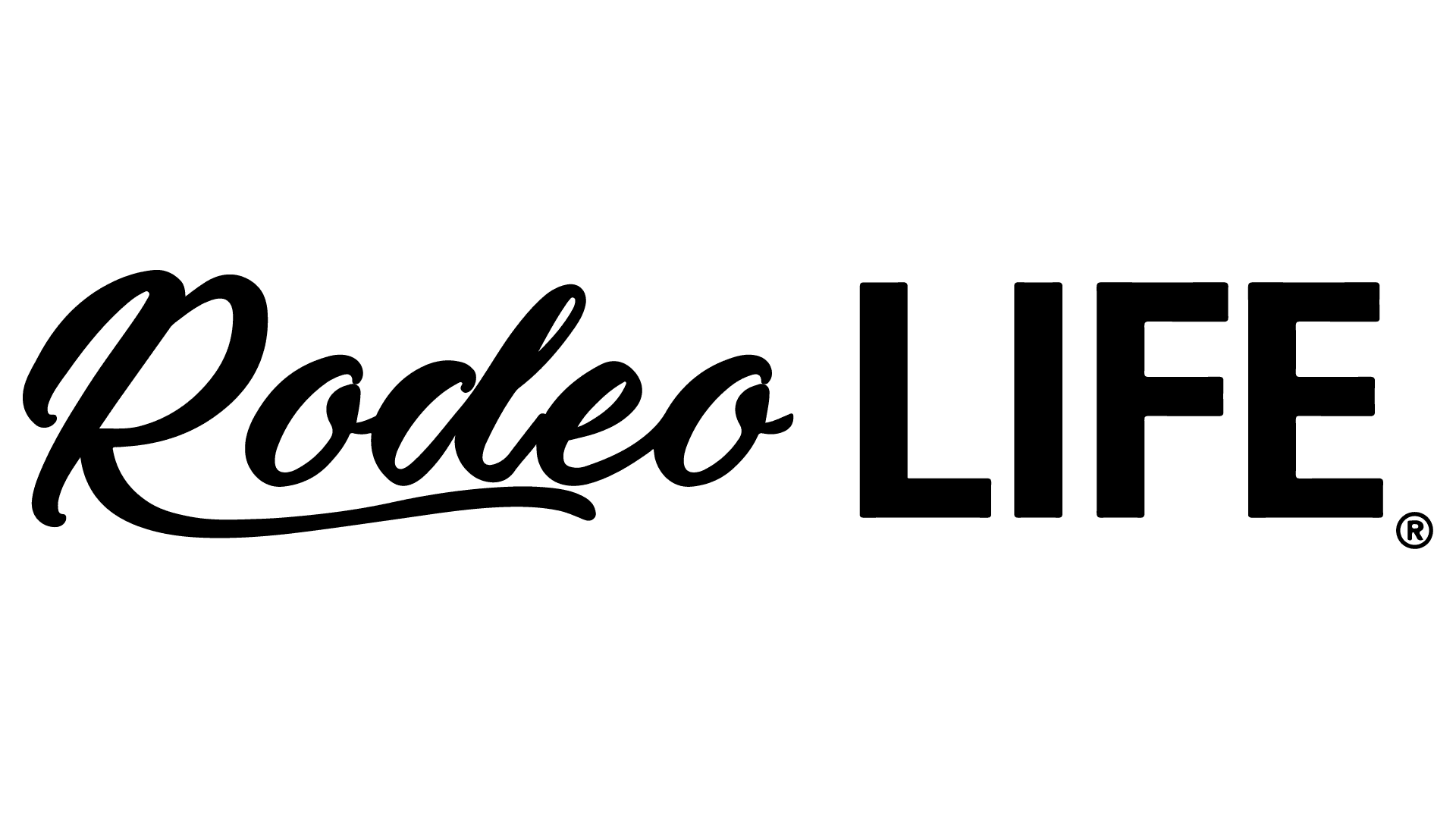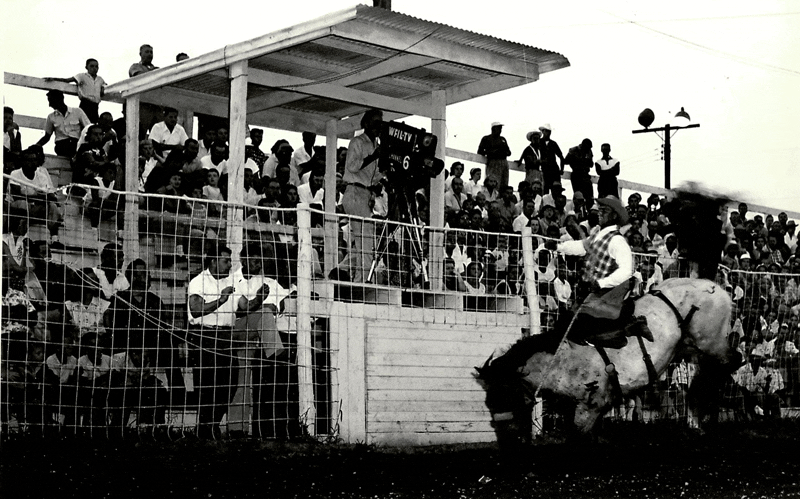[ Cowtown Rodeo “Best Show on Dirt”
spanning five generations.]
Congratulations to the entire Harris family for their induction of their Cowtown Rodeo, located in Pilesgrove, New Jersey, to the ProRodeo Hall of Fame. Grant and Betsy Harris, 4th generation of Harris’ to own the rodeo are thrilled with the honor. Betsy said, “When I got the call I didn’t recognize the number, and hung up on him. But he called right back. Grant never gets excited, but he’s excited over this recognition by the ProRodeo Hall of Fame.”
Grant’s great-grandfather, Howard Harris, started a livestock auction in Woodstown in 1926. Many farms growing vegetables, corn and hay existed in that part of New Jersey and they all needed mules and horses to do their farm work. The auction was a necessity and did well.
Rodeo in the family started as early as 1929 When Grant’s great-grandfather, Howard Harris, and son ‘Stoney’, started a rodeo in conjunction with the Salem County Fair. The Miller brothers, of 101 Wild West fame, good friends of the Harris family, had a hard time financially and were stranded in Washington D C in 1931. The Harris family bought some of the broncs owned by the Millers, and purchased one-way tickets for some of the Miller cowboys to return to Oklahoma, if they would help put on the Harris’ rodeo in Woodstown, New Jersey. The Woodstown rodeo continued during the 1930s Colonel Jim Eskew, well known rodeo and wild west producer, wintered in Woodstown and also shared his knowledge with the Harris’ family. They also put on rodeos in various locales around the northeast, including the 1932 New York State Fair Rodeo in Syracuse; a Sesquicentennial rodeo celebration for Philadelphia in 1926 and assisted the Madison Square Garden rodeos, in New York City, in the early 1950s.
During the War Years, the rodeo was not held. Howard Harris, Grant’s dad, went to college at the University of Idaho and was on their rodeo team. In 1954 Howard qualified for the NIRA Finals and won the All-Around Cowboy honor. He entered the saddle bronc and bulls events, roped and was in the wild cow milking.
In June 1955 rodeo in Woodstown began again, and Howard named it ‘Cowtown New Jersey Rodeo’. It was held from May through September. ‘Cowtown NJ Rodeo’ joined Rodeo Cowboys Association (R.C.A.) and it was the first summer rodeo to get approval to become a member.
Cowtown Rodeo had a problem after only being in the R.C.A. four weeks. Television was just getting accepted and a Wilmington Delaware Channel approached Howard about televising the Cowtown Rodeo. At this time, 1955, R.C.A. considered television to be ‘taboo’ for rodeo, and would only ‘ruin’ the sport. However, Howard knew having the rodeo on television would be good for Cowtown business and he accepted the Channel’s offer. Not only did the television feature the rodeo, the cameras panned the audience. People came in droves, hoping to be seen on television.
In 1958 an ABC television affiliate, Channel 6 in Philadelphia, had picked up Cowtown New Jersey Rodeo. Although Howard had submitted the plans to R.C.A. it was not approved and ‘Cowtown New Jersey Rodeo’ was on their blacklist. ‘Cowtown’ was receiving such good revenue from being televised Howard continued to allow it to be televised, meanwhile paying a fine of $3,000 to R.C.A, the largest fine R.C.A. had ever assessed, up to that time. By the mid-1960s, the attitude of R.C.A. changed and ‘Cowtown’ was no longer fined nor on their blacklist. In fact, the Harris’ signed a contract with the Philadelphia ABC affiliate and every performance gave them two one hour television rodeos, then it went into syndication. Cowtown outgrew the original arena in 1967 and built the existing arena that seats 4,000 fans today.
Meanwhile, Grant began competing at the age of 5 in the Jr. Bull Riding at Cowtown. By the time he was a teenager Grant continued to compete at Cowtown, as well as other area rodeos, and doing quite well. He joined the professional ranks at age 14 and got his RCA card at 17. He attended Casper College, in Wyoming on a full rodeo scholarship. Grant was the R.C.A.’s Northeast Circuit Saddle Bronc Champion in 1975, ’77 and ’78.
Grant was seen competing so often when Cowtown was being televised, that he had quite a following. When he went to the Denver rodeo in January, 1977, Grant was 23 years old, but he was hounded by teen age girls who were seeing the taped rodeos with him, as a teenage saddle bronc rider, from years past.
Grant was not just a competitor, even in his young years he was always very involved in the working part of the Cowtown rodeo and had gleaned as much as possible from his talented dad. He was also the pickup man for each performance. Junior Meek, a bullfighter and steer wrestling competitor from Texas spent a summer working for the Cowtown Rodeo and also did the bullfighting. He said about Grant’s dad, “He was a real cowboy. If you didn’t think so, just try and keep up with him all day. If you roped ten cows, he’d rope fifteen.” He also said, “Lots of cowboys from the West thought you could go back east and easily win a rodeo. That wasn’t so at Cowtown.”
In 1978 Howard decided to retire, and he and wife, Irene, moved to Oklahoma. Grant and bride, Betsy Douglass, bought the Cowtown rodeo from his parents. Betsy handled the secretarial end of the rodeo and much of the publicity. Eight years later Grant bought the auction company and flea market, that had started in 1929, from his granddad, ‘Stoney’. Betsy held various officer positions in the circuit system once PRCA started the circuit system. She was President of the First Frontier Circuit from 1993 to 2019, and before that was secretary and treasurer. The last four years she has been the stock contractor representative. Betsy traveled extensively across the country representing the northeastern circuit group. She retired in January of this year, after 45 years of service. She still attends the PRCA Convention, held in Las Vegas just prior to the National Finals, as does Kate & RJ. “I go to represent Cowtown Rodeo and Three Hills Rodeo livestock, and go to the secretary/timers meeting, and see my kids and visit with old friends,” Betsy explained.
Grant and Betsy have two daughters, Courtney and Kate, that have been involved in Cowtown as long as they can remember. Courtney married Jake Morehead, and are co-owners of Three Hills Rodeo in Bernard, Iowa. They have three children, Sam, age 16; Lily, age 15 and Cade 13.
Kate and husband RJ Griscom, have owned Cowtown since 2019, when buying it from Betsy and Grant. They have two children, Nate, age 10 and Olivia who is 4. Grant and Betsy, aren’t retired by any means, and still work for Kate and RJ. Plus they still own the flea market, and their 1,800 acre ranch, where they raise enough feed for their beef herd and their rodeo stock.
The 5th generation, including Kate and Courtney, and their husbands are totally immersed in rodeo business, and also are taking the up-and-coming 6th generation to youth rodeos. They raise most of their own bucking stock, but they admit there is more buying and selling than earlier when Cowtown owned all their own stock.
Today Cowtown Rodeo is advertised as “Best Show on Dirt!!” It is held on Saturday night, beginning the end of May and continuing through the end of September. The arena also has the PBR Bull Riding there on particular weekends in July and August.
Kate and sister Courtney were always their dad, Grant’s right hands. From age 10 they worked every summer either at the flea market, the auction barn or the rodeo. Kate admits they didn’t see all of it as work, as some of it was definitely fun. But while they worked growing up they learned every aspect of rodeo.
Kate married RJ Griscom in 2010, and although he was raised on a farm, he had also become a professional electrician. Kate said laughingly: “That only lasted about a year, then he became totally involved with the rodeo, the flea market and auction.” When asked how she balanced her responsibilities for Cowtown Rodeo and their children, she said, “It’s been easy, except right now Nate, age 10, has sports practices and rides bulls. But we make it work. We’ve got great support.”
When asked how she handles what her folks do as well as their own jobs for the rodeo, Kate said, “The folks keep doing what they’ve always done. I won’t take over doing what mom does until she asks me.”
When I asked how they would handle the family going to Colorado Springs to receive their honor of being inducted, who would stay at Cowtown Rodeo and put on that Saturday night performance, she said, “We’ve got a very good group of guys and gals that have been with us for a long time. They know how to do everything. We won’t be worried about it.”
Cowtown Rodeo in Pilesgrove, New Jersey, is in excellent hands. The honor of being inducted in to the ProRodeo Hall of Fame is an honor that surprised the Harris family completely, but according to those who have been to Cowtown Rodeo and know the Harris’ history and what they have accomplished are in agreement – this honor is certainly one they have earned.
Harris Male Ancestors Kept Journals:
Very few families can boast that their history was kept by the male members of the family in diaries or journals. But the Harris family from Woodstown/Pilesgrove, New Jersey, can give you accounts of happenings from the time they arrived in America 327 years ago.
The Harris ancestors came from Wales in 1696. They landed in Manhattan and continued on to Salem County, New Jersey, where they settled, receiveing a deed to their property dated 1696. Their Salem County livestock brand was registered with the King of England in 1706.
Various men of this family did interesting things during those early days. Their experiences and adventures would never have been remembered if these early ancestors had not used diaries and journals to pass on the history of their family and what they accomplished.
During the Revolutionary War John Harris joined the Continental Army and fought at Valley Forge with George Washington. His responsibility was to take cattle and wagon loads of food to the soldiers. He was also a bombardier, responsible for aiming the cannon during battle. Later he was assigned to an area in western Pennsylvania because the government anticipated the British would attack them from the West at this location – but it never happened. It was the custom of the government to give soldiers money when they mustered out. But because the government ran out of money, they gave Captain John Harris a parcel of land at the confluence of the Ohio River and the Monongahela River. At that time it was the opinion of everyone that ‘No white man would ever live that far west!” Because of that opinion Captain John sold it for a gallon of whiskey!! Today that area is Pittsburgh, Pennsylvania. Imagine what the family could get for that parcel of land once it became such a viable city.
The Harris family for generations have been fortunate the men of their earliest days here kept journals and relayed such important information through their writings. It is something that 95% of our families wish they had on their families in written form.









